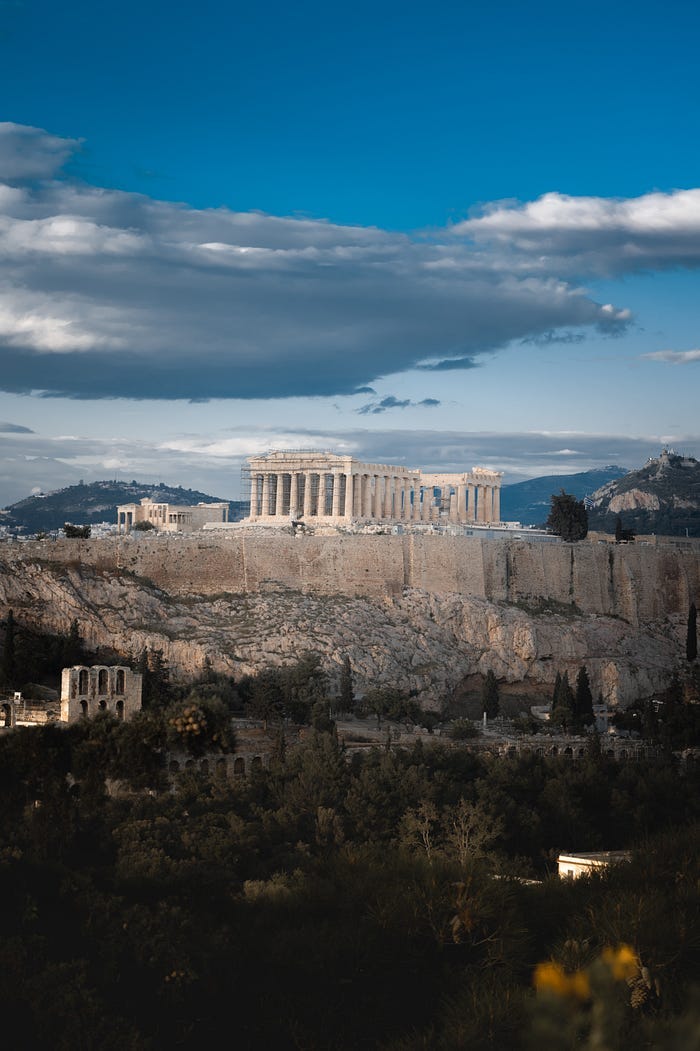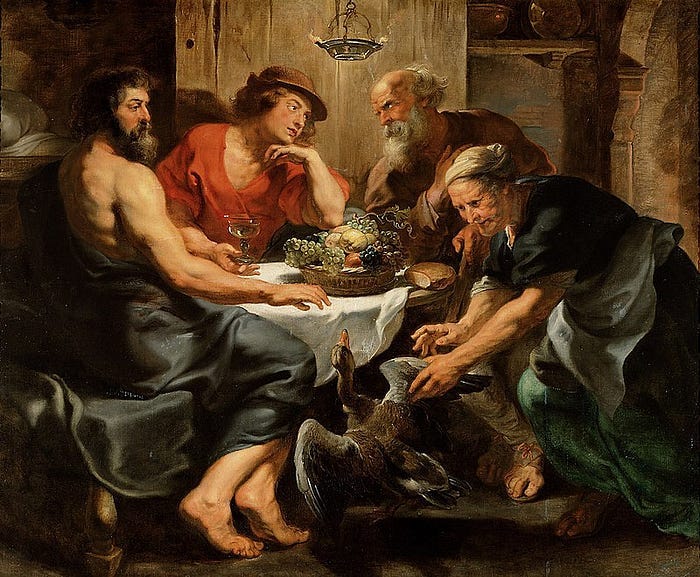Philoxenia: An Ancient Greek Method To Heal Divided People
A lesson from our ancestors on the forgotten concept of hospitality

“Hospitality was considered to be one of the most virtuous qualities in ancient Greek culture, and philoxenia is the word to describe the value and respect extended towards a guest or visitor in your home or a stranger on the street.”
— India Doyle, Culture Trip
In our modern world, it appears we deal with endless conflict. It’s like real life wants to mirror Twitter with its acidic one-upmanship, and countless arguments. But it doesn’t have to be this way.
The ancient Greeks may not have been familiar with social media or the mindless things we argue about, but they understood conflict.
While it’s called ancient Greece, it wasn’t one nation. The people were divided between countless city states with small geographic boundaries that were constantly at war. So, traveling by land required crossing many borders.
As Victor Davis Hanson explains in A War Like No Other, you couldn’t escape this problem by sea either.
Greek sailing technology was limited. This forced them to hug the coastlines, and they also had to pull their boats on land almost daily to do maintenance. So, you couldn’t sail directly from point to point.
Now, let’s review: they were divided, constantly at war, and had small boundaries. Sounds like a disaster waiting to happen, doesn’t it? Yet their society didn’t collapse.
The ancient Greek historian Herodotus traveled widely, trade was conducted throughout the land, and cultural events like the Olympics took place regularly. They also prospered and pushed back invasions from the Persian Empire.
But how could a divided people do so much? One word: philoxenia.
It’s correct they were divided, but philoxenia worked as a secret method of cohesion. When we say the word “hospitality,” we only see it with one layer. Philoxenia has many.
The extra layers we don’t quite have a word for acted as a glue, which held the people together against all odds and it’s still there today. In fact, it may just be the adhesive we need today to hold us together.
So, what is this philoxenia?
The Layers Of Philoxenia
Giorgos Tsiros at the Greek tourism site, Greece-Is, says philoxenia is much deeper than a warm welcome. He refers to it as “a code of values with deep roots stretching all the way back to antiquity.” It’s driven by a mix of mythology, culture, and religion.
Tsiros also explains the word’s best essence can be derived as a combination of two other Greek words: philótimo and geneodoria
Philótimo has a deep association with honor. It’s a duty to go above and beyond for another — above professional obligation or personal feeling. It even trumps animosity. Plus, all this is done with nothing expected in return.
Geneodoria in its base meaning means “brave at giving presents.” According to Tsiros, this is demonstrated all throughout present day Greek culture, where it’s common place to invite strangers to dinner. Also, picking up the tab is seen as an honor.
In other words, to give — even to a stranger — is an honor, not a imposition. Both concepts make up layers of philoxenia, but there’s even more if you look towards mythology and religion.
Hospitality By Order Of The King Of The Gods
According to Kerry Kolasa-Sikiaridi at the Greek Reporter, the king of the gods Zeus, was also known as “Zeus Xenios.” due to his role as the guardian of travelers and strangers.
This concept was immortalized in Ovid’s “Metamorphoses.” In the poem Zeus and Hermes disguise themselves as wandering travelers looking for shelter. Many ignore them, except an old couple.
This couple feeds the gods and gives them wine. Suddenly realizing their visitors are more than just common travelers, the duo kills and prepares their only goose for the strangers.

Overjoyed Zeus turns the couple’s humble home into a beautiful temple and grants them any wish they desire. So, philoxenia was beyond just cultural, it was important enough to be called for by the ultimate god in the Greek pantheon of deities.
Despite Zeus’ decline in the modern age, the god’s demand imprinted itself on the Greek soul even today.
In fact, one of the greatest examples of philoxenia comes much closer to our time, far from antiquity.
Giving The Wealth Of A Village To Strangers
“When your neighbor needs something, he needs you…Not the army. Not the police. You. And if you’re not there, someday you’ll have to look him in the face and explain.”
— Yiorgos Pattakos, Natural Born Heroes by Christopher McDougal
On a dark night on February 1944, a group of men appeared on the outskirts of Yiorgos Pattakos’ village on Crete. The villagers likely viewed them warily. The island had been occupied by the Nazis, who brutally massacred Greeks for insubordination.
The strangers identified themselves as resistance fighters, and they needed help. They had a man with them who required a mount to ride on.
The men also gave no explanation why or where they were going.
The villagers faced a dilemma. If they got caught helping these men, soldiers would burn their village down and kill everyone in it — a terrifying possibility.
Furthermore, the mount — a donkey — was a major part of the small village’s economy. Imagine giving away your car to strangers you barely knew, with no guarantee of getting it back.
But honor demands one give beyond professional obligation and personal feeling. One must also be brave at giving presents. Since you already read the quote from Yiorgos Pattakos, you know where this is going.
Young Pattakos was sent with the villages’ only donkey which they gave to the strangers. But it gets better.
The man that needed the mount was Major General Heinrich Kreipe, the highest-ranking Nazi on the island. The resistance fighters captured him. Philoxenia from the Cretans from village to village kept the party under cover and stopped German search teams from finding them.
Although many villagers paid the price for this hospitality after Kreipe was evacuated from the island into the hands of the British.
A Glue To Hold Together Divided People
A quick check on social media will remind you people are divided and discourse is relatively acidic. But it’s not the first time in human history this has happened. The ancient Greeks thrived in this environment.
While they divided into warring city states, the highest god in their land reminded them strangers and travelers were to be treated with generosity and kindness. The concept adhered Corinthians, Spartans, and Athenians together into Greeks.
It imprinted on their culture, becoming a matter of honor. The concept even exceeds animosity between individuals and overpowers fear as evidenced on Crete.
Furthermore, it’s still there today driving the thriving tourism industry in Greece by welcoming strangers and travelers from across the globe. As Giorgos Tsiros reminds us:
“If tourism is the major driving force of the Greek economy, then philoxenia is its fuel.”
If anything can quiet acidic relations, it’s hospitality — but not just any hospitality — the Greek form of philoxenia with its layers of philótimo and geneodoria.
Originally posted on Medium 2/14/22



Interesting, Thanks.